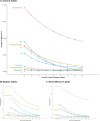Collectivism, individualism and COVID-19 prevention: a cross sectional study of personality, culture and behavior among Canadians
- PMID: 35528715
- PMCID: PMC9067981
- DOI: 10.1080/21642850.2022.2069571
Collectivism, individualism and COVID-19 prevention: a cross sectional study of personality, culture and behavior among Canadians
Abstract
Background: Collectivism has been identified as a protective factor against COVID-19 - perhaps due to increased conformity with social norms regarding prevention behaviors. Other studies have also found that individualism can inspire uptake of preventative behaviors as a means of personal protection. It is possible that these cultural orientations may promote different patterns of prevention (e.g. mask wearing vs. social distancing). Furthermore, existing studies examining the role of individualism and collectivism during the COVID-19 pandemic have frequently failed to account for other psychological processes, including differences in personality, which could help provide a better understanding of the psychological process underlying prevention behavior.
Methods: Participants were recruited using social media advertisements. The Cultural Orientations Scale measured individualism-collectivism and hierarchism-egalitarianism. The Ten Item Personality Inventory measured the five factor model of personality. Multivariable models, dominance analyses and structural equation mediation tests were used to identify the most important predictors of COVID-19 prevention behavior (i.e. mask-wearing, hand-washing, reducing social interactions, physical distancing, staying at home and social bubbling), controlling for demographic and situational factors.
Results: Among 774 participants, most (i.e. 60-80%) reported uptake of COVID-19 prevention behaviors. Higher vertical (hierarchical) collectivism was associated with staying at home and higher horizontal (egalitarian) individualism was associated with mask-wearing and reducing social interactions. Neither Vertical Collectivism nor Horizontal Collectivism were significantly associated with any of the prevention behaviors when controlling for personality traits and confounding variables. Agreeableness was identified as a key mediator of the correlation between these cultural orientations on general uptake of COVID-19 prevention behaviors.
Conclusions: Cultural orientations (e.g. collectivism-individualism, hierarchism-egalitarianism) and personality traits (e.g. Agreeableness) are salient correlates of COVID-19 prevention behaviors and therefore should be accounted for in the development, design and delivery of health promotion messages aiming to increase uptake of these behaviors.
Keywords: COVID-19; Collectivism-individualism; agreeableness; cultural orientations; mask-wearing; personality; social distancing.
© 2022 The Author(s). Published by Informa UK Limited, trading as Taylor & Francis Group.
Conflict of interest statement
No potential conflict of interest was reported by the author(s).
Figures


Similar articles
-
Predicting attitudes toward mitigation interventions and social distancing behaviors at the onset of the COVID-19 pandemic in the United States.Health Psychol Behav Med. 2023 Aug 16;11(1):2247055. doi: 10.1080/21642850.2023.2247055. eCollection 2023. Health Psychol Behav Med. 2023. PMID: 37601894 Free PMC article.
-
Individualism-Collectivism and COVID-19 Prevention Behaviors in Young Adults: The Indirect Effects of Psychological Distress and Pandemic Fears.J Psychol. 2023;157(8):496-515. doi: 10.1080/00223980.2023.2250057. Epub 2023 Sep 7. J Psychol. 2023. PMID: 37677127
-
Mask-wearing behavior during the COVID-19 pandemic in Korea: The role of individualism in a collectivistic country.Int J Disaster Risk Reduct. 2022 Nov;82:103355. doi: 10.1016/j.ijdrr.2022.103355. Epub 2022 Oct 11. Int J Disaster Risk Reduct. 2022. PMID: 36249123 Free PMC article.
-
Does culture influence what and how we think? Effects of priming individualism and collectivism.Psychol Bull. 2008 Mar;134(2):311-42. doi: 10.1037/0033-2909.134.2.311. Psychol Bull. 2008. PMID: 18298274 Review.
-
The Lineage Theory of the Regional Variation of Individualism/Collectivism in China.Front Psychol. 2021 Jan 20;11:596762. doi: 10.3389/fpsyg.2020.596762. eCollection 2020. Front Psychol. 2021. PMID: 33551912 Free PMC article. Review.
Cited by
-
Social trust and COVID-19 mortality in the United States: lessons in planning for future pandemics using data from the general social survey.BMC Public Health. 2024 Aug 27;24(1):2323. doi: 10.1186/s12889-024-19805-y. BMC Public Health. 2024. PMID: 39192297 Free PMC article.
-
Examining the cultural influence on online stances towards COVID-19 preventive measures and their impact on incidence and mortality: A global stance detection analysis of tweets.SSM Popul Health. 2024 May 7;26:101679. doi: 10.1016/j.ssmph.2024.101679. eCollection 2024 Jun. SSM Popul Health. 2024. PMID: 38779457 Free PMC article.
-
Beyond the Books: COVID-19's Influence on Future Life Behaviors of Aspiring Medical and Health Professionals.J Med Educ Curric Dev. 2024 Aug 20;11:23821205241272357. doi: 10.1177/23821205241272357. eCollection 2024 Jan-Dec. J Med Educ Curric Dev. 2024. PMID: 39165406 Free PMC article.
-
Predicting attitudes toward mitigation interventions and social distancing behaviors at the onset of the COVID-19 pandemic in the United States.Health Psychol Behav Med. 2023 Aug 16;11(1):2247055. doi: 10.1080/21642850.2023.2247055. eCollection 2023. Health Psychol Behav Med. 2023. PMID: 37601894 Free PMC article.
-
Adolescents' Opinions on COVID-19 Vaccine Hesitancy: Hints toward Enhancing Pandemic Preparedness in the Future.Vaccines (Basel). 2023 May 10;11(5):967. doi: 10.3390/vaccines11050967. Vaccines (Basel). 2023. PMID: 37243071 Free PMC article.
References
-
- AL-Omiri, M. K., Alzoubi, I. A., Al Nazeh, A. A., Alomiri, A. K., Maswady, M. N., & Lynch, E. (2021). COVID-19 and personality: A cross-sectional multicenter study of the relationship between personality factors and COVID-19-related impacts, concerns, and behaviors. Frontiers in Psychiatry, 12, 126. doi:10.3389/fpsyt.2021.608730 - DOI - PMC - PubMed
-
- Anglim, J., & Horwood, S. (2021). Effect of the COVID-19 pandemic and big five personality on subjective and psychological well-being. Social Psychological and Personality Science, 12(8), 1527–1537. doi:10.1177/1948550620983047 - DOI
LinkOut - more resources
Full Text Sources
